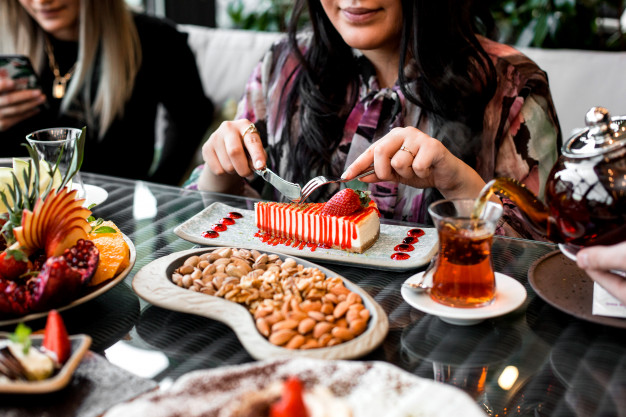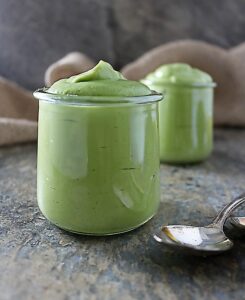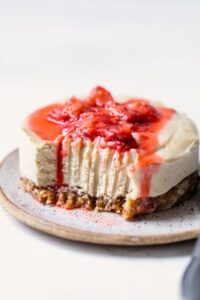
Think back to your most cherished childhood memories with your family. Whether you fondly remember holiday gatherings, birthday parties, or a night out at a favorite restaurant—there’s often one common denominator—sweet treats and desserts.
It can be a major letdown when your chronic pain, autoimmune condition, or inflammation makes it so you can’t enjoy a celebratory treat or dessert. In fact, it’s downright isolating. For anyone who’s ever sat in the corner while everyone else enjoyed a special occasion dessert—this blog is for you!
Today we’re talking about why you should avoid traditional sweet treats like cakes, cookies, ice-cream, and pie and how they can sabotage your progress in healing from chronic pain and inflammation. But don’t worry if you have a sweet tooth—we’ll be sharing three of our favorite super easy, super delicious low-inflammation treats that will quickly become family favorites.
Top Two Dessert Ingredients that Fuel Inflammation
Let’s start by identifying why many dessert recipes aren’t suitable for those on a low-inflammation diet. It all boils down to two primary ingredients found in almost every dessert out there—refined carbohydrates and added sugars.
Why Are Refined Carbohydrates a Problem for Inflammation?
Refined wheat flour is cheap, filling, and delicious when mixed with butter, milk, eggs, and sugar in various desserts. But watch out—refined wheat flour is a significant inflammation trigger.
As we mentioned in our blog, Top Four Holiday Inflammation Flare Up Foods, a study conducted in 2014 indicated that a diet high in refined carbohydrates (like wheat flour) caused insulin resistance and increased inflammatory markers.
We suggest looking for recipes that incorporate whole wheat flours or gluten free flours such as nut flours, coconut flour, or oat flour for a better low-inflammation substitute. If baking isn’t your forte, try visiting a local health food store for some pre-made low-inflammation treats—you’ll be surprised at how many options there are to choose from these days.
Why Are Added Sugars a Problem for Inflammation?
Eating a diet that’s high in added sugars can cause several unfavorable changes in your body, leading to acute or chronic inflammation.
- Weight Gain— Excessive sugar can inflame fat cells triggering the release of chemicals that increase weight. Studies have shown excess weight to be related to inflammation due to insulin resistance.
- Excess AGEs— High sugar diets cause excess AGEs (or advanced glycation end products) in the body. AGEs are a normal part of our metabolism, but when you have excess AGEs caused by too much sugar in your diet, you can expect inflammation and oxidative stress. This happens when excess AGEs bind with our cells and essential proteins—interfering with their regular function.
- Higher Cholesterol— Scientists believe that added sugars can cause spikes in our LDL cholesterol (or the “bad” cholesterol). This has been demonstrated in studies that measure LDL cholesterol and inflammation markers like CRP (or C-reactive protein).
- Leaky Gut—The high carbohydrates associated with sugars can destroy your gut health, damaging the stomach’s protective lining and eventually leading to a “leaky gut.” According to Harvard University, leaky gut is a major contributing factor to inflammation and the subsequent diseases that can come with it.
You may think that because you only have sweet treats occasionally, they won’t affect your healing, but that’s not necessarily true. It can take days or weeks to recover from sugar-related inflammation leaving you feeling sluggish, tired, achy, and irritable when you could otherwise be feeling great.
3 Low-Inflammation Special Desserts That Will Make Any Occasion Sweeter
Now that you know what to avoid, let’s dive into some delicious special occasion desserts that won’t set you back in your healing progress.
Two-Ingredient Vegan Chocolate Banana “Ice Cream”
(No-bake, refined sugar-free, raw, vegan)

This two-ingredient chocolate banana ice cream recipe comes together as fast as it will disappear off your plate. Everyone is sure to enjoy the inflammation-busting quality of dark cocoa and the creamy, velvety texture of frozen and blended ripe bananas.
Equipment
Food processer or powerful blender, such as a Vitamix or BlendTec
Ingredients
- 3 Ripe Bananas (large)
- 2 tbsp. Dark Cocoa Powder
Instructions
Slice the bananas into 1/4 inch slices and scatter them on a baking sheet lined with parchment paper or aluminum foil. Be sure banana pieces don’t touch or overlap each other.
Freeze banana pieces for 3-4 hours or until fully hardened.
Add the frozen banana slices into your food processor or Vitamix blender.
Process the banana pieces, making sure to scrape the sides until they resemble soft-serve ice cream.
Sprinkle in the dark cocoa powder and blend again—once again, remembering to scrape the sides.
Transfer your “banana ice cream” into an airtight and freeze again until it firms up and is scoopable with an ice cream scoop (roughly 1 hour).
Easy 5 Minute Vegan Avocado Pudding

This gluten-free, refined- sugar-free, and dairy-free pudding is simple to prepare and ready to enjoy in 5 minutes or less!
Equipment
Food processer or blender
Ingredients
- 1 Avocado
- 2 Ripe Bananas or 1 Pear
- Lemon or Lime Juice to Taste
Instructions
Blend all ingredients in a food processor or blender until smooth.
If you’d like, top with chopped nuts, toasted coconut, cocoa nibs, fresh berries, or any other topping of choice.
Also delicious frozen into popsicle molds in the hotter months.
Raw Vegan Strawberry “Cheesecake”
(No-bake, refined sugar-free, paleo, raw, vegan)

If you haven’t tried any raw food recipes, this “cheesecake” is a must! It takes just minutes to put together, a couple of hours to chill, and boom—you’re done! Your friends and family will be AMAZED when they find out this fluffy, creamy dessert is healthy (and low-inflammation).
- 1 ½ cups Raw Cashews
- ½ cup Full Fat Canned Coconut Milk
- ½ cup Maple Syrup
- 2 tablespoons Coconut Milk (Room temperature)
- ¼ cup Coconut Oil (melted)
- 2 teaspoons Vanilla Extract
- Pinch Salt
- 1 cup Raw Pecans
- ½ cup Medjool Dates
- ¼ cup Sliced Strawberries
Instructions for Date-Pecan Crust:
In a food processor, combine the pecans and Medjool dates until the dough sticks together. The crust is ideal when it’s slightly coarse in texture—don’t over blend.
Line an 8″ by 8″ dish with parchment paper or foil. Press the dough into the baking dish, then set aside.
Instructions for “Cheesecake” Filling:
Start by soaking the cashews in boiling water for about 1 hour until they are soft. Once the cashews are soft, drain away the water.
In a food processor or blender, blend the cashews until they become a paste.
Take the room temperature maple syrup and coconut oil and slowly incorporate it into the cashews while blending. Puree this mixture until completely smooth!
Pour both room temperature coconut milks in with the cashew mixture.
Add the salt and vanilla to the filling and continue blending until completely smooth.
Then pour the filling over the crust.
Topping:
Top with sliced strawberries.
Freeze the cheesecake until it is solid (3-5 hours).





